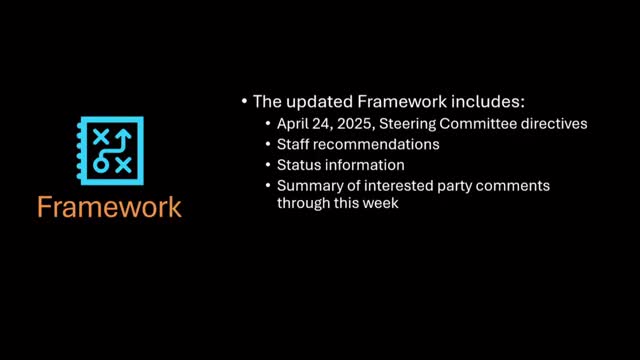Broward planning committee will pause select BrowardNext policies amid legal uncertainty over Senate Bill 180
Get AI-powered insights, summaries, and transcripts
Subscribe
Summary
The Broward County Planning Council steering committee voted unanimously to move forward with a phased update to the BrowardNext land‑use plan while placing policies staff judges "likely more restrictive or burdensome" under Senate Bill 180 into a separate, preserved document for future action.
The Broward County Planning Council steering committee voted unanimously to move forward with a phased update to the BrowardNext land‑use plan while placing policies staff judges "likely more restrictive or burdensome" under Senate Bill 180 into a separate, preserved document for future action.
Planning council staff told the committee that recent state reviews under Senate Bill 180 have led to letters declaring whole plan transmittals ‘‘null and void’’ in other jurisdictions and that the statute’s undefined standard — "more restrictive or burdensome" — has been applied inconsistently. To avoid having the county’s entire transmittal rejected, staff recommended transmitting only limited changes now, and publishing the held items as a separate document (staff proposed calling it "Prepared for Progress") with narratives and ready materials so the county can resume full action if the legal environment changes.
Miss Blake Boy, planning council staff, said the staff recommendation grew out of examples from elsewhere in Florida where newly adopted or transmitted plan language was found objectionable under SB 180. "There will be no comprehensive plan amendments or code changes that are considered more restrictive or burdensome," she told the committee, summarizing how the state has been enforcing the law. She and other staff said local governments have already received form letters in some cases and that the state has struck long‑standing policies when municipalities transmitted full plan readoptions.
Committee members debated how to preserve resiliency and other priorities without provoking a state determination that could nullify an entire submittal. The staff proposal does not remove existing BrowardNext policies; instead, it separates additions or clarified language that might be singled out by the state. "The good news is everything that exists in the plan continues to exist," Miss Blake Boy said, adding that the items held would be preserved for workshops and public input and would remain ready for adoption if the law changes or litigation resolves.
Some elected officials and committee members argued for greater urgency in keeping resiliency language in the active transmittal. Mayor Gomez said the concept of resilience is embedded in sustainability and warned against over‑editing language to avoid conveying a weaker commitment: "The vagueness lets us do what we need to do without putting any restrictions on us to be able to include what we feel creates the resiliency," she said. School Board Member Dr. Zeman urged caution about long delays: "We are not being able to make the progress that the citizens of Broward County want for our land use policy," he said.
Staff reviewed several specific policy areas flagged for holding in abeyance, including expanded resiliency references, certain pedestrian/bicycle/transit interconnectivity wording, activity‑center parking and shared‑parking refinements, natural‑resource map references, and new climate‑adaptation map series. Staff also said some transportation concurrency and impact‑fee policies must be deleted to comply with recent state statutes and county ordinances. Where possible, staff proposed shifting strong mandates to incentive‑based language (for example changing a "shall" to a "should") or keeping existing policy language intact and not transmitting the clarified additions at this time.
The committee directed staff to: proceed with the phased approach outlined in the presentation (transmit limited changes now; collect held items in a separate "held in abeyance" document with narratives), prepare a highlighted‑regional‑issues narrative for public reference (staff recommended deleting the adopted "highlighted regional issues" section and replacing it with a non‑adopted narrative), and schedule public workshops. Staff said it anticipates holding at least one workshop in December and another in January, with a planning council update at the January meeting and further steps toward transmittal depending on litigation or legislative action.
For the record, planning council staff and committee members described multiple forms of legal risk: the state has, to date, used form letters to assert a plan or transmittal is void under SB 180 (staff identified Sections 18 and 28 of the bill as most relevant), and developers can also trigger statutory notice and short cure periods that could lead to litigation and fee exposure. Staff characterized the implementation risk of moving all clarifying language forward now as significant and recommended a conservative phased approach.
At the close of the meeting the steering committee voted unanimously to "move forward with the path that's laid out in front of you" — i.e., transmit limited changes and preserve other items in a separate document for future action. Committee members asked that the preserved materials be posted and explained on the BrowardNext webpage so cities, residents and the Broward delegation can see what changes the county would pursue if SB 180 is amended or judicially narrowed.
Next steps listed by staff included preparing the "held in abeyance/Prepared for Progress" document, drafting the highlighted‑regional‑issues narrative for deletion from the adopted plan and public posting, scheduling public workshops (December and January windows), and reporting back at the January planning council meeting.
